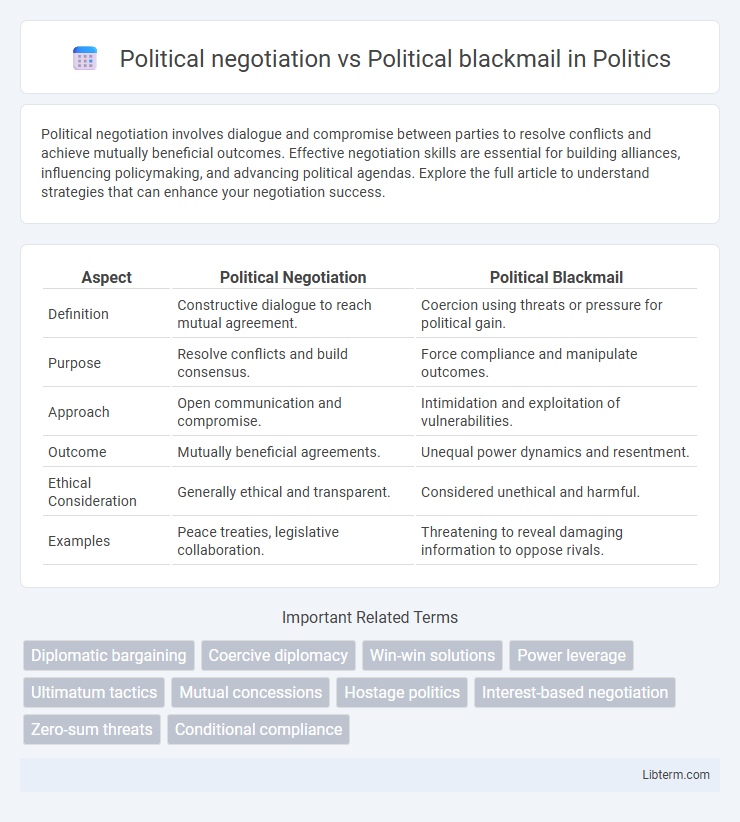Political negotiation involves dialogue and compromise between parties to resolve conflicts and achieve mutually beneficial outcomes. Effective negotiation skills are essential for building alliances, influencing policymaking, and advancing political agendas. Explore the full article to understand strategies that can enhance your negotiation success.
Table of Comparison
| Aspect | Political Negotiation | Political Blackmail |
|---|---|---|
| Definition | Constructive dialogue to reach mutual agreement. | Coercion using threats or pressure for political gain. |
| Purpose | Resolve conflicts and build consensus. | Force compliance and manipulate outcomes. |
| Approach | Open communication and compromise. | Intimidation and exploitation of vulnerabilities. |
| Outcome | Mutually beneficial agreements. | Unequal power dynamics and resentment. |
| Ethical Consideration | Generally ethical and transparent. | Considered unethical and harmful. |
| Examples | Peace treaties, legislative collaboration. | Threatening to reveal damaging information to oppose rivals. |
Understanding Political Negotiation: Definition and Principles
Political negotiation involves dialogue between parties aiming to reach a mutually acceptable agreement through compromise and cooperation. It is based on principles such as transparency, respect for diverse interests, and the pursuit of common ground to resolve conflicts peacefully. Unlike political blackmail, which relies on coercion and threats to force decisions, political negotiation fosters trust and sustainable solutions in governance.
Defining Political Blackmail: Tactics and Implications
Political blackmail involves coercive tactics where one party uses threats, manipulation, or exposure of sensitive information to force a political opponent into compliance, undermining democratic processes. Unlike political negotiation, which relies on dialogue, compromise, and mutual agreement, blackmail exploits power imbalances and fear to achieve objectives unethically. This coercive method erodes trust, distorts policymaking, and can lead to increased corruption and political instability within governance structures.
Core Differences Between Negotiation and Blackmail
Political negotiation involves a mutual exchange where parties seek common ground through dialogue and compromise, while political blackmail relies on threats or coercion to force compliance. Negotiation aims at fostering collaboration and achieving win-win outcomes, contrasted with blackmail's exploitative tactic that undermines trust and decision-making autonomy. Key differences hinge on intent, methods, and the ethical considerations governing the interaction between political actors.
The Role of Trust in Political Negotiation
Trust is the cornerstone of effective political negotiation, enabling parties to engage in open dialogue and pursue mutually beneficial agreements without fear of betrayal. Unlike political blackmail, which undermines trust by coercing concessions through threats or manipulation, genuine negotiation relies on credible commitments and transparent communication. Building and maintaining trust fosters cooperation, reduces conflict, and increases the likelihood of sustainable political outcomes.
Ethical Boundaries in Political Power Plays
Political negotiation involves strategic dialogue aimed at mutually beneficial outcomes within ethical boundaries, emphasizing transparency, respect, and the welfare of constituents. In contrast, political blackmail exploits threats or coercion to manipulate decisions, violating ethical standards and undermining democratic principles. Maintaining clear ethical boundaries in political power plays preserves trust, accountability, and the legitimacy of governance.
Consequences of Political Blackmail on Governance
Political blackmail undermines the legitimacy and stability of governance by coercing political actors to make decisions driven by fear rather than public interest, often resulting in policy distortions and corruption. It erodes trust between government institutions and citizens, weakening democratic processes and encouraging authoritarian tendencies. Persistent political blackmail can lead to institutional paralysis, reducing government effectiveness and exacerbating social conflicts.
Case Studies: Successful Political Negotiations
The Camp David Accords between Egypt and Israel in 1978 exemplify successful political negotiation, where diplomatic dialogue led to a historic peace treaty without coercion. In contrast, political blackmail often undermines trust and complicates resolution efforts, as seen in coercive tactics used during Cold War proxy disputes. Effective political negotiation relies on transparent communication and mutual concessions, fostering sustainable agreements that avoid the destructive outcomes associated with blackmail.
Real-World Examples of Political Blackmail
Political blackmail involves the coercion of political figures or entities through threats, often exploiting sensitive information or leverage to force decisions, unlike political negotiation, which relies on dialogue and compromise. Notable real-world examples include the Watergate scandal, where illicit surveillance was used to manipulate political outcomes, and recent cases in international relations where states have threatened economic sanctions or withheld aid to compel policy changes. Such tactics undermine democratic processes and trust, contrasting sharply with legitimate negotiation that seeks mutually beneficial solutions.
Safeguarding Democratic Processes Against Manipulation
Political negotiation fosters democratic processes by enabling transparent dialogue and compromise among stakeholders, promoting accountability and public trust. Political blackmail undermines these principles through coercion and unethical threats, distorting decision-making and eroding institutional integrity. Safeguarding democracy requires robust legal frameworks and vigilant civil society oversight to detect and prevent manipulative tactics, ensuring fair representation and governance.
Building a Culture of Transparency in Political Dealings
Building a culture of transparency in political dealings fosters trust and accountability, distinguishing negotiation from coercion in decision-making processes. Political negotiation involves open dialogue, mutual respect, and the exchange of ideas to achieve common goals, whereas political blackmail undermines democratic principles by using threats or manipulation for personal gain. Embedding transparency practices such as public disclosures, ethical guidelines, and participatory frameworks strengthens governance and reduces the risk of corruption.
Political negotiation Infographic

 libterm.com
libterm.com